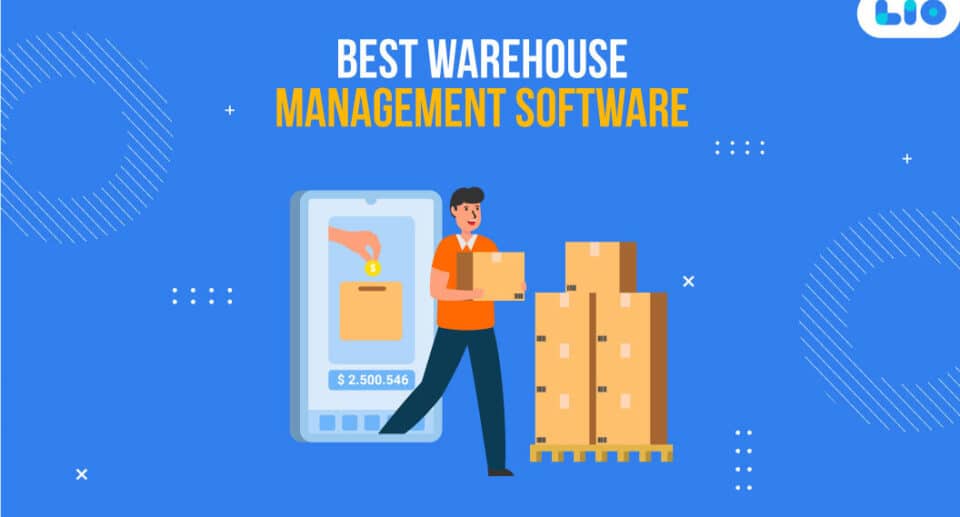Streamline Your Operations with the Best Warehouse Management Software
Surabhi Guleria
- August 23, 2023
- 10 Min Read

Want to know more about warehouse management software? Read the article to know all about it.
In today’s fast-paced and competitive business landscape, effective warehouse management is crucial for maintaining operational efficiency and meeting customer demands. One way to achieve this is by leveraging the power of warehouse management software (WMS). In this article, we will explore the key features and benefits of the best warehouse management software solutions available in the market.
Definition and Overview Of Warehouse Management Software
Warehouse Management Software (WMS) is a specialized software solution designed to streamline and automate various warehouse operations, including inventory management, order fulfillment, and tracking. It provides businesses with real-time visibility and control over their inventory, enabling efficient warehouse operations and optimizing the supply chain.
WMS typically includes features such as inventory tracking, order processing, receiving and putaway, picking and packing, shipping, and reporting. It leverages technology such as barcode scanning, RFID, and automation to enhance accuracy, speed, and productivity in the warehouse.
In an overview, warehouse management software acts as a central hub that integrates and manages all warehouse activities, allowing businesses to optimize their operations, reduce errors, improve efficiency, and enhance customer satisfaction. It enables businesses to have better control over their inventory, minimize stockouts and overstocking, and streamline order fulfillment processes.

Take control of your inventory with Lio
Simplify management, eliminate errors, and grow your business. Get started now!
Importance of WMS in Optimizing Warehouse Operations and Inventory Management
Warehouse Management Software plays a critical role in optimizing warehouse operations and inventory management for businesses. Here are some key reasons why WMS is important:
Enhanced Inventory Accuracy
WMS provides real-time visibility into inventory levels, locations, and movements. This accuracy helps businesses reduce errors, eliminate stockouts, and optimize inventory replenishment, leading to improved order fulfillment rates and customer satisfaction.
Efficient Order Processing
WMS streamlines the entire order processing workflow, from receiving orders to picking, packing, and shipping. It automates and optimizes these processes, reducing manual errors, minimizing processing time, and ensuring timely and accurate order fulfillment.
Improved Warehouse Efficiency
With features like optimized slotting, wave picking, and automated replenishment, WMS helps businesses increase warehouse efficiency and productivity. It enables better space utilization, optimal inventory placement, and efficient resource allocation, resulting in cost savings and improved operational performance.
Enhanced Supply Chain Visibility
WMS provides end-to-end visibility across the supply chain, allowing businesses to track inventory, monitor order status, and manage suppliers more effectively. This visibility enables proactive decision-making, faster response times, and better collaboration with suppliers and customers.
Data-Driven Insights
Warehouse Management Software generates detailed reports and analytics on key performance metrics, such as inventory turnover, order accuracy, and labor productivity. These insights help businesses identify areas for improvement, make informed decisions, and optimize warehouse operations for maximum efficiency.

Key Features of the Best Warehouse Management Software
Listed are some of the main key features of warehouse management software.
Inventory Management
- Real-time inventory tracking and visibility.
- Barcode scanning and RFID integration.
- Stock optimization and cycle counting.
Order Fulfillment
- Streamlined order processing and picking.
- Order routing and wave planning.
- Automated packing and shipping.
Warehouse Layout and Organization
- Efficient space utilization and storage optimization.
- Bin and location management.
- Cross-docking and putaway strategies.
Reporting and Analytics
- Customizable dashboards and real-time reports.
- Performance metrics and KPI tracking.
- Data-driven insights for better decision-making.
Integration and Scalability
- Seamless integration with other business systems (e.g., ERP, CRM).
- Scalable solutions to accommodate growing business needs.
- Compatibility with various hardware devices (e.g., barcode scanners, mobile devices).

Boost Your Business Efficiency with…
Lio’s Inventory Management. Streamline operations and maximize profits. Try Lio today!
Benefits of Implementing Warehouse Management Software
Listed are some of the key benefits of warehouse management software.
Increased Efficiency
Implementing Warehouse Management Software (WMS) can bring several benefits that enhance overall efficiency in warehouse operations:
Streamlined Workflows and Reduced Manual Errors
WMS automates various warehouse processes, eliminating the need for manual data entry and reducing errors associated with manual tasks. This streamlining of workflows improves overall operational efficiency.
Improved Order Accuracy and Faster Order Fulfillment
With WMS, order processing becomes more efficient, ensuring accurate picking, packing, and shipping. This leads to higher order accuracy rates and faster order fulfillment times, resulting in improved customer satisfaction.
Enhanced Labor Productivity and Resource Optimization
WMS optimizes labor allocation and resource utilization through features like task assignment, workload balancing, and labor tracking. This improves labor productivity and enables better resource planning and optimization.
Inventory Optimization
Warehouse Management Software helps businesses optimize their inventory management processes:

Accurate Demand Forecasting and Inventory Replenishment
WMS provides tools for demand forecasting based on historical data and market trends. By accurately predicting demand, businesses can optimize inventory levels and ensure timely replenishment, reducing stockouts and overstocking.
Reduction in Stockouts, Overstocking and Carrying Costs
With WMS, businesses can maintain optimal inventory levels to meet customer demand without excessive stockouts or overstocking. This reduces carrying costs associated with excess inventory and minimizes the risk of stock obsolescence.
Minimized Inventory Shrinkage and Obsolescence
WMS enables accurate inventory tracking, ensuring that inventory is properly accounted for and reducing the risk of inventory shrinkage or loss. It also helps identify slow-moving or obsolete items, allowing businesses to take proactive measures to minimize obsolescence.
Enhanced Customer Satisfaction
Warehouse Management Software plays a crucial role in improving customer satisfaction:
Faster Order Processing and on-time Deliveries
With streamlined workflows and efficient order processing, businesses can fulfill orders more quickly, leading to faster delivery times. This results in enhanced customer satisfaction and loyalty.
Real-Time Order Tracking and Notifications
WMS provides real-time visibility into order status, allowing businesses to keep customers informed about the progress of their orders. This transparency builds trust and confidence in the delivery process.
Improved Order Accuracy and Fewer Fulfillment Error
By automating order processing and reducing manual errors, WMS helps improve order accuracy. Fewer fulfillment errors lead to fewer customer complaints and returns, contributing to higher customer satisfaction levels.
Improved Operational Visibility
Warehouse Management Software offers comprehensive operational visibility:
Real-time visibility into inventory levels, order status, and warehouse activities
WMS provides real-time data and insights on inventory levels, order status, and ongoing warehouse activities. This visibility enables businesses to make informed decisions, manage priorities, and respond quickly to changing circumstances.
Comprehensive reporting and analytics for performance monitoring
WMS generates detailed reports and analytics on key performance metrics, such as order fulfillment rates, inventory turnover, and labor productivity. These insights allow businesses to monitor their performance, identify areas for improvement, and implement strategies for continuous optimization.
Better decision-making through data-driven insights
With access to accurate and up-to-date data, businesses can make informed decisions regarding inventory management, resource allocation, and process improvement. This data-driven approach leads to more effective decision-making and improved operational outcomes.

Don’t let inefficient inventory management slow down…
your business. See how Lio can streamline your operations. Experience the power of Lio’s inventory management solutions.
Selecting the Best Warehouse Management Software
When choosing Warehouse Management Software, businesses should consider the following factors:
Functionality
Assess the features and capabilities of the WMS to ensure they align with the specific requirements of the business.
Scalability
Consider whether the WMS can scale with the growing needs of the business, accommodating increased inventory volume and operational complexity.
Ease of use
Evaluate the user-friendliness and intuitiveness of the software to ensure smooth adoption and minimal training requirements.
Integration Capabilities
Check the compatibility of the WMS with existing systems such as ERP (Enterprise Resource Planning) software, e-commerce platforms, and transportation management systems. Seamless integration allows for smooth data flow and process synchronization across various systems.
Exploring the Best Warehouse Management Systems for Optimized Operations
Warehouse management plays a crucial role in the smooth functioning of supply chains and the overall success of businesses. To streamline warehouse operations, minimize errors, and optimize inventory management, businesses often turn to Warehouse Management Systems (WMS). In this article, we will explore some of the best WMS solutions available in the market.
Oracle Warehouse Management Cloud
Oracle offers a comprehensive WMS solution that provides real-time visibility, efficient task management, and inventory optimization. Its advanced features include wave planning, labor management, and integration with other Oracle applications.
SAP Extended Warehouse Management (EWM)
SAP EWM is a robust solution that offers end-to-end warehouse management functionalities. It provides features like resource optimization, advanced picking strategies, and integration with other SAP modules. With its rich analytics capabilities, businesses can gain valuable insights for continuous improvement.
Manhattan Associates Warehouse Management System
This WMS solution is known for its scalability and flexibility. It offers comprehensive functionalities such as inventory tracking, order fulfillment, labor management, and transportation integration. Manhattan Associates WMS provides real-time visibility and enables efficient decision-making.
JDA Warehouse Management
JDA’s WMS is a powerful solution that helps businesses optimize warehouse operations and drive productivity. It offers features like labor management, yard management, and slotting optimization. With JDA WMS, businesses can improve inventory accuracy, reduce cycle times, and enhance customer service.
Blue Yonder Warehouse Management
Blue Yonder’s WMS solution is designed to address the challenges of modern warehouses. It offers robust inventory management, order processing, and labor optimization capabilities. With its advanced analytics and machine learning capabilities, Blue Yonder WMS enables predictive and prescriptive insights for operational excellence.

Optimize Inventory Control Today
Ready to regain control over your inventory? Explore our inventory management tool and unlock features like real-time tracking, automated reordering, and precise demand forecasting. Start optimizing your inventory management now.
How Lio can Help You?
To make your dreams come true of having a business of your own and managing it nicely, Lio App can help you big time. The app lets you keep all sorts of data together in a more organized manner. You can keep records, and create tables and lists while working solo or with a team.
The many features of Lio would help you with your retail business as you would be able to maintain all data on a track that you can use at any time. If you want to upload a document, then you can do that. Know the money transactions, cash inflow, profit and loss you are making, Udhaar, list of products, services, and even the teammates and clients that you have all in one place.
Your retail business ideas will certainly become successful businesses if you go on this journey of managing your business with Lio.
Conclusion
Investing in the best warehouse management software can significantly transform your warehouse operations, leading to increased efficiency, improved inventory management, and enhanced customer satisfaction. By automating and optimizing critical warehouse processes, you can stay ahead of the competition and meet the demands of today’s dynamic business landscape.
Frequently Asked Questions (FAQs)
What is warehouse management software?
Warehouse management software (WMS) is a software application designed to manage and control various aspects of warehouse operations, including inventory tracking, order fulfillment, and warehouse organization.
How does warehouse management software benefit businesses?
Warehouse management software helps businesses improve operational efficiency, optimize inventory levels, enhance order accuracy, and gain real-time visibility into their warehouse activities.
Can warehouse management software integrate with other business systems?
Yes, many warehouse management software solutions offer integration capabilities with other business systems such as ERP (Enterprise Resource Planning) and CRM (Customer Relationship Management) systems to ensure seamless data flow and process synchronization.
Is warehouse management software suitable for small businesses?
Yes, there are warehouse management software solutions available that cater to the needs of small businesses. It is essential to choose a warehouse management software that aligns with the specific requirements and budget of your small business.
Can warehouse management software be customized?
Many warehouse management software solutions offer customization options to tailor the software to your specific business needs. You can configure workflows, define user roles, and customize reports and dashboards according to your requirements.







